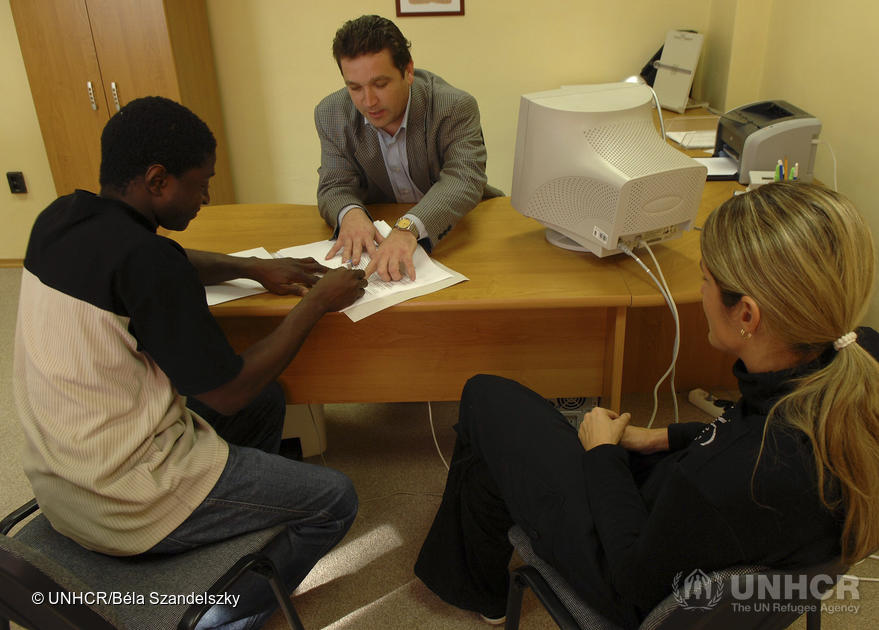
An asylum-seeker attends a legal hearing in Hungary. ©UNHCR/Béla Szandelsky
Statement made by Jean-Nicolas Beuze, the UNHCR Representative in Canada:
Thank you for the opportunity to discuss the proposed changes to Canada’s asylum system as outlined in the Budget Implementation Act (BIA). Providing technical advice to increase efficiencies in asylum systems is an integral part of UNHCR’s advisory role worldwide, and we support any measures that ensure prompt decision-making while upholding the essential elements of a fair asylum system.
While the number of asylum-seekers arriving in Canada increased over the last two years, I have previously noted that measures taken by the Government have maintained access to asylum in a humane and efficient manner with adequate security checks. UNHCR recognizes that governments, including Canada, must strike a balance between managing migration flows, ensuring border security, and maintaining public confidence in asylum and immigration systems. In this context, onward movements of asylum-seekers from countries like the U.S. may be perceived, by the general public, as a misuse of asylum. It is therefore legitimate for governments to take measures to address such concerns, and find ways to triage cases to ensure fair, efficient and robust processes in a timely manner. In doing so, they must abide by their international obligation to grant refuge to those at risk of persecution.
UNHCR welcomes the investments to Canada’s asylum system in the 2019 Budget. They build on increased efficiencies gained over the last two years. The proposed legislative changes that we are discussing today form part of a broader strategy. It includes a significant increase in funding to the police, border agency, legal aid and the Immigration and Refugee Board (IRB), which seek to increase cost-effective efficiencies at the front end of the asylum process. New investments in refugee healthcare and housing will also benefit refugees and asylum-seekers.
Under the proposed changes, individuals who have made an asylum claim in countries that have a data sharing agreement with Canada would be barred from having their case heard before the IRB. However, they will not be barred from claiming asylum in Canada or from being recognised as refugees. Indeed, they will be channelled through the Pre-Removal Risk Assessment (PRRA).
The PRRA has the same protection objectives as the refugee determination process at the IRB. It is based on the same grounds and confers the same degree of refugee protection. In other words, the same definition will be applied to assess whether someone is in need of protection in Canada because of risks they may face in their country of origin.
What ultimately matters is that every case is fully assessed on the merits and that no individual is forcibly returned to a country where he or she will be at risk of torture or persecution.
UNHCR is pleased with the amendment to the Bill that the Government introduced and that the House Finance Committee adopted earlier this week, which entrench in legislation the right to a PRRA hearing for those concerned by the new measures. This amendment reflect the assurances previously received by UNHCR from the government and repeated by Minister Blair at the CIMM that, under an enhanced PRRA, no one would be removed without due process. This notably includes the right to a hearing prior to removal and to have one’s fear of persecution fully presented and considered. This in line with Canadian and international jurisprudence. I would urge Senators to similarly support this amendment, which would firmly guarantee an important aspect of due process.
Moving forward, protection safeguards built into the PRRA process must be fully utilized, including through the adoption of policies ensuring procedural fairness guarantees. In order to further ensure procedural fairness, asylum-seekers falling into this new stream will need to have access to fulsome information about the PRRA process, effective language interpretation and access to counsel. Similarly, PRRA officers will have to be trained further specifically previous jurisprudence form the IRB and on how to conduct individual hearings in a fair and efficient manner, including by ensuring that counsel can play their role fully through interventions during the course of the hearing. In addition, UNHCR would encourage the Government to put in place automatic stays of removal pending judicial review of a negative PRRA decision to the Federal Court for persons affected by the changes contemplated in the Bill, as these persons will not have access to another appeal mechanism.
UNHCR has long supported Canada’s refugee adjudication model and the IRB and its independence as a model. At the same time, UNHCR recognizes that finding ways to increase efficiencies through better triaging and streamlined processes while upholding access to fair procedures are legitimate objectives. In discussing these complex realities, often of a technical nature, we all have a responsibility and must work together to ensure that the conversation about asylum and refugees remains objective and balanced, based on sound legal analysis and facts. Asylum systems must at times be flexible to address changes in the patterns and profiles of asylum-seekers to remain fair, cost-effective and efficient, thus ensuring public confidence in their integrity all while ensuring that no one is returned to face persecution. UNHCR will continue to work with the Canadian government to ensure that the new measures are implemented in a manner that afford due process and respect international protection standards.
Thank you.





